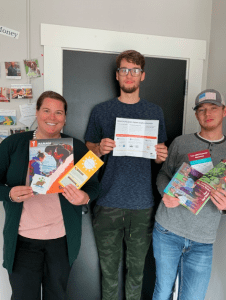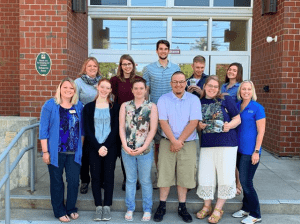Oct 24, 2019 | Exclusive |
Give Me My Dam Money!
Dam Credit Scores: How interest rates and credit scores could ruin your life.
Albert Einstein once said, “Compound interest is the eighth wonder of the world. He who understands it, earns it … he who doesn’t … pays it.”
Understand that interest accrued over the life of any loan is how banks and lenders make money off of us, the borrowers. And your credit score is the measure by which lenders decide what interest rate you will receive.
There is a stark contrast in the amount of interest you will pay when buying a car with a superprime credit score as opposed to doing so with a subprime credit score. For example, the interest paid on a car loan worth $20,000 with a credit score above 780 (superprime) will be roughly $1,000 over fours. However the interest payment on a car loan of the same amount and same repayment period but with a credit score below 600 (subprime) would be nearly four times as much. It doesn’t have to be a car, it could be a house or a boat, or any other large purchase.
Building a good credit score now while you are in college will make your life much easier after graduation and save you thousands, if not hundreds of thousands, of dollars.
Contact the Financial Literacy Peer Education Program to begin taking control of your credit today! DM us on Instagram at Umf_Finlit or send me an email at caleb.grover@maine.edu to set up an appointment.

Oct 24, 2019 | News |
Leanna Farr Contributing Writer
When it comes to finances, the UMF Financial Literacy Peer Educators (FinLit), is the place to go. The program was created last year after Janet Mills, former state attorney general and the current governor of the state of Maine, donated $901,000 to a grant to fund the program which was set to be implemented at all seven public universities in Maine by 2021.
FinLit provides various financial services, such as one-on-one appointments and exit loan counseling on top of organizing presentations and events. The peer educators are experts on FAFSA, credits, loans, budgeting, investing, taxes, and saving.
With coordination from Sarah Hinman, the Financial Literacy Peer Education Coordinator, UMF was the first campus to implement the financial literacy program. Hinman has implemented the same program at the University of Maine at Augusta and University of Maine at Orono this year.
Caleb Grover, a senior business economics major, has been a peer educator since the program began last year. “Our most popular service is filing the FAFSA with students,” said Grover. “One of the program’s missions is to increase the number of students filing their FAFSA in the state of Maine.” Only around 40% of students are filing their FAFSA to receive financial aid, grants and work-study.

Sarah Hinman, Jacob Leonard, and Caleb Grover, Members of the #FinLit Squad (Photo courtesy of Leanna Farr)
To try and help students with filing their FAFSA, FinLit held an event where peer educators helped students file their FAFSA for free while eating cake. They also advertised a drawing for a $25 gift card. “It went really well, even better than last year which went really well for the first year having it,” Grover said. “This year there was even higher attendance. There was at least one student there at all times.”
“The key to our success is definitely partnering with other offices to promote and have support for bigger campus-wide events,” Hinman said. They achieve this by giving presentations for admissions with visiting high school students and working with the career services and Merrill Hall.
When discussing the work as a peer educator Grover said “it’s a professional but relaxed environment where we help students face challenges so they don’t make the same mistakes we did.” Working with other students has made him realize “there are a lot of situations you don’t realize are going on until you hear someone’s situation,” he said, “it is grounding working with people that have it a lot worse than you and you offering them help.
Jake Leonard, a junior in the computer science major, also works as a financial peer educator. “There is a lot going on with other student’s finances that you wouldn’t expect. Some people come it not knowing that they owe $30,000 and others are really stressed but only owe a minimal amount,” he said. “There’s a visible weight lifted when people come in and sit with us and understand.”
For more information about upcoming events, learn more about the peer educators, and get financial tips, check out their Instagram @umf_finlit. The peer educators can also found in room 201 at Franklin Hall.
Oct 10, 2019 | Exclusive |
Financial Literacy Column
Every year millions of students fail to file the free application providing them with the financial aid necessary to continue their college education. That free application is the FAFSA, and it’s mandatory that students who will be returning to school the following year file the application.
The financial aid provided by the FAFSA includes grants and work-study eligibility, in addition to federally subsidized and unsubsidized student loans.
Grants, like the Pell Grant, are free money, meaning the student does not have to pay it back after graduation. Federal Student Loans, like any loan, must be paid back. They are the only student loans with six-month grace period after graduation, while other loans require payments to be made right away, making repayment much more difficult.
As of Oct. 1, students are able to file the FAFSA for the 2020-21 school year. If a student files a FAFSA with the Educators before Nov. 1, they will be entered to win a cash prize.
Students can reach out to the UMF Financial Literacy Peer Education Program by emailing caleb.grover@maine.edu or DMing them on Instagram @umf_finlit.

Sep 26, 2019 | Feature |
Give Me My Dam Money! — Financial Advice
As summer passes and the temperatures plummet be careful that you don’t find your funds as low as the mercury. A budget is one of the best ways to ensure you’re being financially responsible.

Stop by Franklin 201 for any financial help needs (Photo courtesy of the UMF Financial Literacy Program).
There are many free resources available to help keep track of your spending. The finance app, Mint, is regarded as one of the best budgeting tools. A great offline alternative is Excel, which has budget templates where you enter your income and expenses. If you choose Excel. I suggest that after filling out the budget you withdraw cash for each budget item (i.e. groceries, gas, fun money, etc.) and put that cash into envelopes. This will give you a visual of the $40 separated for gas money and the $70 for groceries, and help you stick to the parameters you’ve set.
There are many recommendations for exactly how much money to budget for each expense, but it’s really up to you. But remember if you’re able, try to save as much as you can every week. Future you will greatly appreciate it.
If you would like help creating a budget, reach out to the UMF Financial Literacy Peer Education Program by emailing caleb.grover@maine.edu or DM us on Instagram @umf_finlit.
Oct 11, 2018 | News |
By Abby Shields Contributing Writer
The Financial Literacy program is being re-established with a 5-year long plan advised by program coordinator Sarah Hinman designed to help better educate students about finances in college and prepare them for life after UMF.
“Our mission is to increase the financial literacy of UMF students by providing them with student led informational programming regarding personal finance, student loan borrowing, default prevention, and financial aid,” said Hinman.
Hinman was hired in April as a program coordinator and hand selected eight peer educators: Abby Waceken, Austin French, Bailey Parenteau, Caleb Grover, Isaac michaud, Jake Leonard, McKayla Marois and Sarah Veilleux. When August arrived, Hinman and the peer educators came to campus for a week long training.
The program started the first day of school, with the goal being for Hinman and her team to reach across the UMaine system. The educators at UMF, known as the #finlitsquad, run the program, giving Hinman the opportunity to travel across Maine, educating other schools about financial literacy
Sarah Veileux, a junior at UMF, is happy to be apart of the team. “I came into this program really just out of being at the right place at the right time when I met the coordinator, Sarah Hinman, at Mantor Cafe through a mutual friend,” said Veileux. “We really just connected as people, she thought I would be a great fit for the program and liked my energy for taking boring topics and making them fun and interesting, and now I’m a Financial Literacy Peer Educator.”
All the members of the team bring something different to the table. “Every educator is expected to perform the basic duties of the program, but they also all bring their own unique personality and skill sets” said Hinman. Whether it be being really good at understanding how to save, knowing how to make the most out of outdoor rec salary, or having experience with investing and budgeting, everyone has a skill they bring to the program.
Makayla Marois, a junior at UMF, is happy to help students in whatever way she can. “My main focus is on saving money. I chose this because of my own personal savings journey that I believe to be successful,” said Marois. “However, I am trained to help students conquer all of their financial demons, just as every peer educator in the program is.”
“Our program does a wide array of programming: once a month we host a pizza power in The Landing where we will have pizza and discuss a financial literacy topic for an hour,” said Hinman.
They also will host special days around FAFSA, reaching out to the local middle/high schools and community colleges and plan to work with the CAs putting on programming throughout the dorms. “We would love to work with clubs, sports teams, and faculty to present to a wide variety of student groups,” said Hinman.
As for the years to follow if anyone would like to join there will be a hiring process that consists of an application as well as a interview.
Their next campus event will be a Pizza Power Hour hosted on Wednesday Oct. 17 from 11:45 a.m. to 1:00 p.m. The topic will be on “the 5 steps to making a budget in college.”
If students have questions the best way to contact this program is by emailing the coordinator, Sarah Hinman at (sarah.hinman@maine.edu) or stopping by the office in room 201 Franklin Hall.

